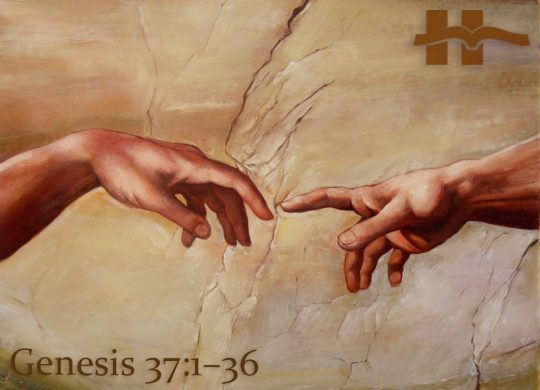Genesis 37:1−36

Agents of God’s blessing to others can expect misunderstanding and mistreatment from them.
The pericope begins with Joseph bringing to his father an “evil report” regarding his siblings (37:2). While the use of dibbah elsewhere indicates “slander” or “evil report” that may not be necessarily true (Num 13:32; Ps 31:4), in light of Prov 25:10 that employs the word to indicate a true (but disparaging) report, there is no reason to think that the dibbah that Joseph brought back to his father about his brothers was a lie (37:2). Rather, in light of the rest of the story, this must have been a true report of evil doings by his brothers. As if this was not bad enough, Joseph is his father’s favorite and the proud possessor of a special tunic. In response, his brothers come to despise Joseph—four times the negative reactions of his brothers are noted: hatred, 37:4, 5, 8; and jealousy, 37:11. Things were so bad between Joseph and the brothers that they could not speak to him “in peace” (37:4). In other words, both his father and his brothers are mistreating this son, one by favoritism, the others by disfavor.
Then he dreams dreams. Of the three pairs of dreams in the Joseph story (in Gen 37, 40, and 41), God is explicitly said to be responsible for the second and third (and/or for their interpretations; 40:8; 41:16). It is fair then, to assume that God is in some way responsible for the first as well. The narrator, neither explicitly nor implicitly, signals any disapproval of Joseph’s words, though father and siblings seem to be considerably miffed. All of this leads one to wonder: Were the interpretations of Joseph’s dream, by his brothers and by his father, accurate? Clearly, they did not pay attention to the grain imagery: only Joseph had a sheaf standing, grain supply intact. The others’ sheaves had collapsed. Could this not be a foreshadowing of what was to come? And would not such a dream perturb even Joseph? And how would he himself be in charge of a bounty of food? This dream was a prophecy, not the self-aggrandizing desires of an adolescent. (The biggest problem with Jacob’s interpretation of Joseph’s second dream is the question of how Rachel, Joseph’s mother, could be conceived of bowing down to him (37:10). If the eleven stars stood for Joseph’s eleven siblings, including Benjamin, surely Rachel was dead by now, not having survived the labor and delivery of Benjamin [35:16–19].)
One day, Jacob sends Joseph to check out the welfare of his siblings. What happens next is utterly reprehensible. The imprisoning of Joseph in the pit is virtually a death sentence— a slow death by exposure (he was stripped) and by thirst (he had no water, 37:23–24). Joseph is left in the pit (37:23–24), and the brothers sit down for a meal in a cavalier act of brutal negligence, perhaps even enjoying the food Joseph had transported (37:25). The word “brother” resounds throughout the pericope 21 times, a subtle deprecation by the narrator of this hideous deed, reminding the reader of the dreadfulness of what the men perpetrated upon their younger brother, Joseph. The prisoner then ends up a slave, in Egypt.
Everyone seems to have turned against Joseph: his father, rather irresponsibly, sends him off to Shechem, to his brothers. The brothers, of course, are merciless—en masse they come across as heartless beasts, not very different in nature from the “wild animal” they claimed had devoured Joseph. But through it all, the sovereignty of God scintillates: the dreams, the strange man directing Joseph to Dothan, the utter silence of the victim, and, in retrospect, the haven that Egypt would turn out to be for the fledgling nation of Israel. At any event, this is about agents of God’s blessing expecting misunderstanding and mistreatment.
The reader is instructed by the narrator to see Joseph (retrospectively) as an instrument of divine blessing in the hands of God. For such a one, what can be expected is misunderstanding and mistreatment. As children of God, all believers in Christ are called to be agents of blessing to those around them and to the world. This pericope warns the Christian as to what can be expected when he or she attempts to fulfill that calling to be a blessing: misunderstanding and mistreatment.












 Abe Kuruvilla is the Carl E. Bates Professor of Christian Preaching at The Southern Baptist Theological Seminary (Louisville, KY), and a dermatologist in private practice. His passion is to explore, explain, and exemplify preaching.
Abe Kuruvilla is the Carl E. Bates Professor of Christian Preaching at The Southern Baptist Theological Seminary (Louisville, KY), and a dermatologist in private practice. His passion is to explore, explain, and exemplify preaching.
4 Comments
Yes! 🙂 Is it also at the DTS bookstore?
Yup. Also on Amazon.
“… the strange man directing Joseph to Dothan”
Ok, I admit I’ve never paid that guy much attention. So why is he there? Why not just say Joseph found his bothers after looking for them?
Rodney, you’ll have to find a good commentary on Genesis to find the answer. [Ahem!]